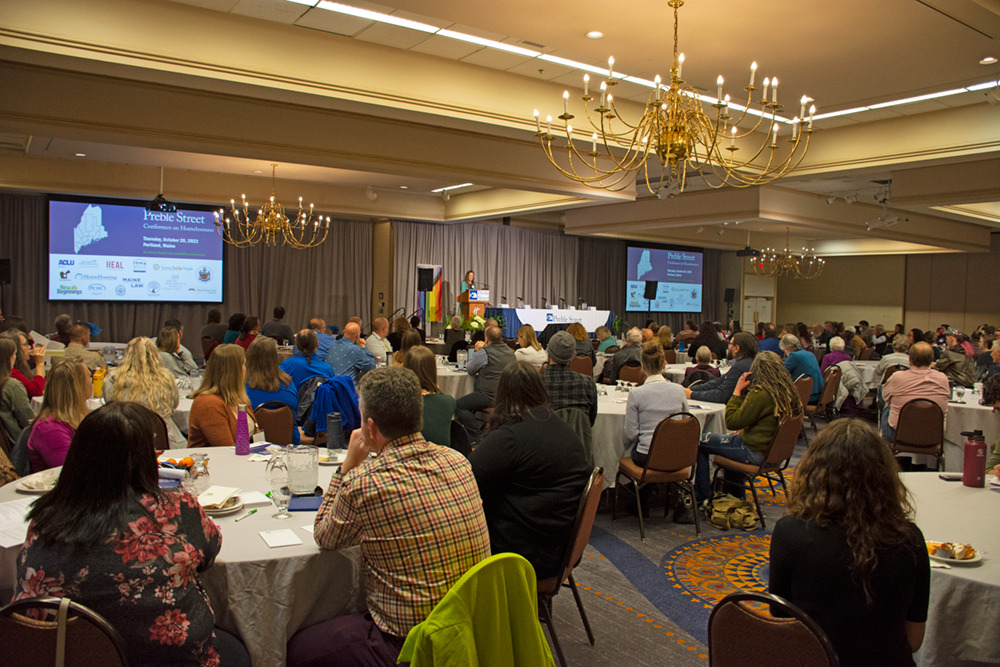“There are days it can feel like we’re alone in this work, it’s nice to come together like this and remember that we’re not.”
– Conference on Homelessness attendee
Last week, over 200 political, social services, business, and faith leaders from across the state of Maine came together for the first-ever Preble Street Conference on Homelessness. These leaders were joined by people with lived experience of homelessness on panels and in the audience. “We can’t talk about what works or doesn’t work without hearing from people who have directly experienced homelessness – their lived experiences tell us what works or not, where there are gaps in our systems, and what we need to do better to provide the services that people need,” said Donna Yellen, Vice President of Strategic Initiatives. “Their experiences and resiliency also give us hope for the future and belief that we can end homelessness.”
Tackling difficult topics including a better shelter system, statewide solutions, youth homelessness, criminalized homelessness, unsheltered homelessness, and healthcare, presenters and attendees collaborated on dissecting the best ways to implement solutions to the growing homelessness crisis and determining what needs to happen right NOW to support people facing this crisis.
Many participants highlighted the need for a better shelter referral system and coordinated efforts by state, city, and non-profit agencies to connect people to services. “Immigrants are resilient people. But the struggles we faced during the pandemic, we’re still facing today,” said Mufalo Chitam of Maine Immigrants’ Rights Coalition on how these missing pieces have affected New Mainers.
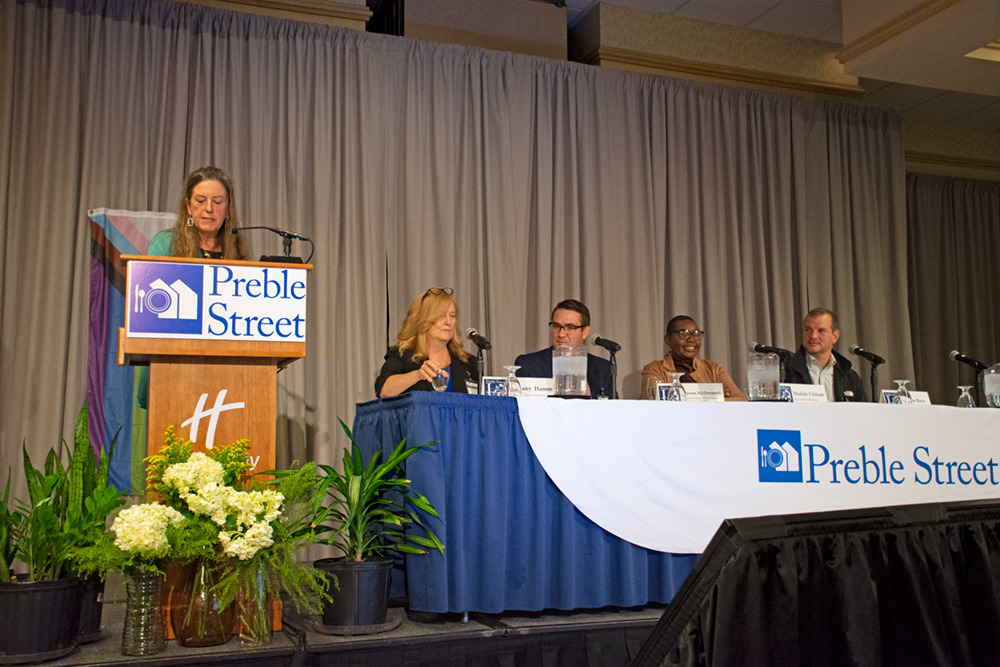
Presenters in several workshops emphasized the need for more shelters and policies that lift up rather than push down vulnerable community members. “We need to address NIMBYism statewide if we want to accomplish anything. People staying in shelters and on the streets are members of our community too,” shared Steph Primm of the Knox County Homeless Coalition. “Policies that ban life sustaining conduct in public, like sleeping & camping, effectively prohibit unhoused people from existing in public spaces and threaten them with civil and criminal penalties for the involuntary act of living without a home,” remarked Meagan Sway of the Maine ACLU. “Sleeping is only criminalized when you’re homeless,” added Frank D’Allessandro of Maine Equal Justice.
Low-barrier shelters and services were also top of mind. “If you’re not weaving harm reduction into your homeless services, you’re not doing it right,” said Andrew Bove, Preble Street Vice President of Social Work. “When we turn someone with substance use disorder away from shelter or other services, we take away that little piece of hope and it has a cascading effect,” shared Jennifer Sinclair of the Health Equity Alliance.
And the disproportionate effect of homelessness and poverty on BIPOC and LGBTQ+ communities was kept at the forefront of every topic. “In 2021, a full 55% of the youth and young adults that we served at our Teen Shelter, identified as BIPOC, compared to 1.9% in Maine’s general population.” Said Leah McDonald, Senior Director of Preble Street Teen Services.
Preble Street, thanks to the support of the Atlantic Charitable Fund, is planning to host a conference on homelessness every two years in different parts of the state. For more information about this year’s event, please visit the Conference website.
2022 Conference Event Programming
Thursday, October 20, 2022
| 9:00 am | Welcome – Mark Swann, Executive Director, Preble Street |
| 9:15 am | Video: Voices of Homelessness |
| 9:45 am |
The State of Homelessness in our State Mark Swann, MSPA, Executive Director, Preble Street |
| 10:00 am |
Better Shelters Shelters play a critical role in the larger network of social supports. When done right, these spaces play a vital role in our public health response and provide people with safety and dignity until more permanent solutions are found. The past several years of the pandemic have highlighted the many gaps in Maine’s shelter system – not enough shelters, not enough beds, not enough flexibility to meet the complex needs of people experiencing homelessness. So what have we learned from these gaps and what do better shelters look like for individuals and families? Facilitator: Donna Yellen, Vice President of Strategic Initiatives, Preble Street
|
| 11:15 am |
Statewide and Regional Approaches and Solutions This panel discussion will discuss scalable initiatives to end homelessness, including Housing First, state-wide service hubs, Built for Zero, and more. Facilitator: Ali Lovejoy, Vice President of Mission Advancement, Preble Street
|
1:00-2:30 pm Workshop sessions #1
|
Workshop 1: Will There Be A Criminalization of Homelessness Post-COVID? Shelter is a human right. The pandemic has increased unsheltered homelessness in Maine and throughout the country. As unsheltered homelessness grows, so does the rise of police interactions with individuals experiencing homelessness. Studies show direct correlations between these events. Can we expect the criminalization of homelessness will rise? What is Maine already doing to combat this? Every state has a Human Rights Commission, but not many have expanded their purview to take homeless people’s perspective as Maine has. How do we as a community prevent the criminalization of homelessness? Join this panel of expert lawmakers, legal advisors, and advocates with lived experience for a stimulating, passionate, and thought-provoking discussion on the criminalization of homelessness, what it is, how it happens, what has been done in Maine and throughout the country to prevent it and steps we can take now to stop it. Facilitator: Terence Miller, JD, Director of Advocacy, Preble Street
|
Workshop 2: A Conversation on Homelessness with Maine’s Healthcare Stakeholders Healthcare is a critical need for Maine’s homeless populations. Hear from Maine Medical Center, Penobscot Community Health Care, and others about the innovative solutions and the issues, including behavioral health, recuperative care, and substance use, keeping them awake at night. Our panelists will discuss the challenges facing healthcare providers today, what’s been working for Maine’s healthcare facilities, and what needs they see ahead. Facilitator: Caroline Fernandes, Director of Health Services, Preble Street
|
3:00-4:30 pm Workshop sessions #2
|
Workshop 3: Solutions for Youth Homelessness in Maine Too often, youth homelessness is overlooked or undetected; many young people who are homeless fall under the radar of official counting efforts, resulting in large data gaps and chronically underfunded services. In 2020, 30 percent of Maine’s homeless population was under age 24, including 139 unaccompanied youth and young adults, according to official counts. However, youth service providers agree that these numbers are likely a substantial underestimate of the reality in Maine. The scope of this problem is daunting, but substantial efforts are underway in Maine to address it. Facilitator: Leah McDonald, LCSW, Senior Director of Teen Services
|
Workshop 4: Understanding how People become Unsheltered People are unsheltered because the system is not working. What needs to change to reduce the number of unsheltered people? Facilitator: Henry Myer, Director, Elena’s Way, and Street Outreach Collaborative, Preble Street
|
Chris Bicknell (he/him), Executive Director, New Beginnings


Andrew Bove is a Vice President of Social Work at Preble Street. Andrew has worked at Preble Street since 2008 and has held a variety of positions at the agency. Andrew is also a licensed clinical social worker in the State of Maine, a local therapist, and a published qualitative researcher. Andrew believes in strengths-based, low-barrier approaches that prioritize human connection and relationship.
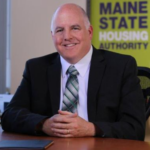
Daniel Brennan became MaineHousing’s Director on April 9, 2018. Mr. Brennan has served in a number of senior staff positions since 1993, including as Senior Director of Programs, Director of Energy & Housing Services, Director of Development, Director of Asset Management, and Internal Auditor. Prior to joining MaineHousing, Mr. Brennan was employed as an internal auditor for Maine National Bank and RECOLL Management Corporation and shortly after joining MaineHousing, he earned the Certified Internal Auditor designation. Mr. Brennan received his B.A. from the University of Maine, Orono and his M.B.A. from Thomas College.

Bill has over 25 years’ experience working with adults and children experiencing homelessness. He has run large programs in San Antonio, Philadelphia and New York City. He came to Portland in 2011 to run the Preble St. Adult Resource Center, in Bayside a day program that served 350 people each day. In 2016 he served as the first director of the Preble St./MMC Learning Collaborative. Today as part of the Portland Police Department’s Behavioral Health Unit he responds to calls from around the city that include mental health, overdoses, or other substance use related issues.
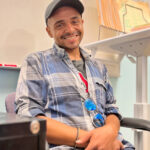

Mufalo Chitam is the Executive Director of the Maine Immigrants’ Rights Coalition (MIRC). She earned her Bachelor of Arts in Public Administration from the University of Zambia and has a wide array of professional experience spanning the fields of health, education, and social services. Since coming to the United States in 2000, she has worked in a variety of capacities to support people throughout Maine to live fulfilling and dignified life. She has worked at the University of Southern Maine, United Way of Greater Portland, and the American Red Cross, to name a few. A community leader at heart, she builds rich connections and advocates to improve the lives of Maine’s immigrant community. She was most recently recognized as a 2022 Maine Biz Women to Watch honoree for her work as an immigrant advocacy leader at MIRC convening a unique, statewide network of 91+ organizations, – representing diverse ethnic communities across our state.

Josh D’Alessio acted with boots on the ground to creatively address barriers that people experiencing homelessness in Bangor faced during the pandemic. He is a MHA, LADC, CCS and has worked for years operating shelters and advocating for mental health and substance use services for those experiencing homelessness. He is currently the Director of Operations and Services at the Health Equity Alliance. On a day off you could find him cooking a nice meal or surfing! His kind, humble and gentle demeanor (outside of the time he is fiercely advocating) prevented him from submitting a bio so we had to do write it for him.

Tom Doherty joined Milestone as Executive Director in April 2022. A trained social worker and experienced nonprofit leader, Tom brings a career devoted to serving individuals and communities, helping to meet needs and advance health, wholeness, and dignity. Before joining Milestone, Tom served for 16 years as Executive Director of Ketcha Outdoors, where he led the growth of their childcare, summer camp, educational, behavioral health programs and the creation of the Portland Gear Hub. While at Ketcha he also led the effort to become a licensed mental health agency and obtained approval as a Maine Department of Education school. Tom resides in Portland with his wife and two sons with whom he gets out as much as he can to hike, bike, kayak.

Lori Dwyer is president and CEO of Penobscot Community Health Care, the largest federally qualified health center in Maine. Lori has been devoted to public and community service throughout her career. Prior to entering healthcare administration, Lori was both an educator and an attorney in private practice. While in private practice at Berstein Shur in Portland, ME, Lori was recognized by the Maine Bar Foundation for her pro bono service as General Counsel and now, as CEO of PCHC, she has been instrumental in driving change at Hope House Health and Living Center, PCHC’s facility containing a 66-bed low barrier emergency shelter, 48 transitional housing units, and co-located primary care clinic. She is currently working with the City of Bangor and the Community Health Leadership Board to solve for the regional challenges with homelessness. Lori holds a JD from the University of Maine School of Law, an M.A. from the University of Alabama, and a B.A. from Duke University.

Lisa Franklin was born in Lewiston, Maine and graduated from the University of Texas at Arlington with a BA in Social Work. After working for a few years in social services she returned to Maine to raise her two children. Lisa became homeless in the year 2020 while fleeing domestic violence. Her lived experience with homelessness, domestic violence and substance use drives her passion for advocacy. Since joining Homeless Voices for Justice in November 2021, Lisa has been a tireless advocate for folks in the unhoused community. This past July, she attended the 2022 National Conference on Ending Homelessness in Washington, D.C. Most recently, Lisa participated in the panel discussion hosted by the Midcoast Hunger Prevention Program to speak about her lived experience with food insecurity and was a guest on WERU’s “Change Agents” show speaking against the criminalization of homelessness.

Deputy Commissioner Bethany Hamm supports the largest agency in state government, the Maine Department of Health and Human Services (DHHS), which has an annual budget of over $3 billion and more than 3,400 employees. She was appointed as Deputy Commissioner in March of 2019.
Deputy Commissioner Hamm has worked in various capacities within the Department for over 35 years. Prior to her current role, she served as the Acting Commissioner of DHHS. For nearly five years she was the Director of the Office for Family Independence. In her role as Director, she was responsible for direct oversight of Maine’s public welfare programs including, Temporary Assistance to Needy Families, Medicaid eligibility, the Supplemental Nutrition Assistance Program, Disability Determination Services, and Child Support Enforcement.
Deputy Commissioner Hamm has been instrumental in advancing policies and partnerships that move families toward economic stability and improve the overall well-being of low-income individuals.

Michael Kebede is Policy Counsel at the ACLU of Maine, where he advocates before state and local governments for policy that advances civil rights and liberties. Previously, Michael was Consumer Rights Advocate at Maine Equal Justice, a civil legal services organization. Before that, Michael was an associate at Verrill Dana. Michael clerked for Chief Justice Saufley of the Maine Supreme Judicial Court, and recently served as Chair of the Charter Commission in Portland. Michael earned his law degree from Boston College, a masters from Oxford University, and his bachelors from the University of Massachusetts at Amherst.

Erin is the director of Rapid Rehousing Services (RRHS) at Preble Street. She has worked at Preble Street since 2013, when she first came to the agency as a Jesuit Volunteer. During her time at Preble Street, she worked with Food Programs, Veteran Housing Services and the Quarantine Shelter before becoming RRHS Director. She has served as one of the tri-chairs of the Maine CoC Coordinated Entry Committee beginning in 2019, and also served as the By Name List Manager for the MCoC Homeless Veteran Action Committee from 2018-2020. She received her Masters in Social Work from the University of Southern Maine in 2020.

Steven McDermott serves as Operations and Special Projects Administrator for the Governor’s Energy Office. Steven has over a decade of experience working for and partnering with Maine nonprofit and government agencies. Steven led a range of statewide initiatives that addressed Maine’s affordable housing challenges, including the implementation of Maine’s first statewide recovery residence program, managing programs to shelter Maine people during the COVID-19 pandemic, and developing several supportive housing initiatives. Steven currently serves as the Vice President on the board of directors for New Beginnings and as a member of the Genesis Community Loan Fund’s loan committee.

Dr. Normandin received his medical degree from Tufts University School of Medicine – Maine Track program. He then completed his Family Medicine residency at Maine Medical Center. His interests include innovative approaches to delivering primary care and working with patients experiencing homelessness. When not working, Dr. Normandin enjoys getting outside and staying active — most often running, biking, stand-up paddle boarding — as well as exploring Portland’s wonderful restaurants. Dr. Normandin also works with the Preble Street Learning Collaborative.

Prior to joining GOPIF, Greg served for more than 14 years as both director of the Maine Affordable Housing Coalition and as a development officer at Avesta Housing, managing all aspects of multifamily rental projects from concept to completion. He is the former board chair of the National Low Income Housing Coalition and has worked for the Atlanta Task Force for the Homeless and the Massachusetts Coalition for the Homeless. Greg earned a BA in Economics from the College of the Holy Cross in Worcester, Massachusetts and a JD from Northeastern University School of Law in Boston.

Rep. Rachel Talbot Ross is a ninth-generation Mainer who has dedicated her career to public service and social justice. In addition to serving as the City of Portland’s Director of Equal Opportunity and Multicultural Affairs for more than two decades, she led the NAACP in Maine and founded several nonprofit organizations, including Maine Black Community Development, Maine Freedom Trails and the Martin Luther King, Jr. Fellows. Rachel chaired the Maine State Advisory Committee to the U.S. Commission on Civil Rights as well as the African American Collection of Maine, housed at the University of Southern Maine.
Rachel is currently serving her third term in the Maine House, representing the Portland neighborhoods of Parkside, Bayside, East Bayside, Oakdale and the University of Southern Maine campus. She serves the Democratic caucus as assistant House majority leader and is the first and only Black woman elected to the Maine Legislature and to legislative leadership.
As a lawmaker, Rachel has worked extensively on justice reform and has shaped critical conversations about equity for all Mainers. She sponsored successful legislation to create Maine’s Permanent Commission on the Status of Racial, Indigenous and Tribal Populations (which she now co-chairs), and also secured passage of landmark bills to include racial impact analysis in the legislative process and expand tribal legal authority over domestic violence against Native Americans.

Prior to Leading Knox County Homeless Coalition (KCHC), Stephanie’s career focused on marketing and brand leadership for national and international organizations. After moving to Maine in 2012, she was asked to re-build KCHC after its family shelter had been shuttered for 2 years. Today KCHC has a team of 60 professionals who offer a wide range of supportive programming and shelter for families and youth. KCHC also has 31 units of affordable housing in the pipeline. Steph served as Chair of Maine’s Statewide Homeless Council for 3 years–2019-2021.

Dr. Debra Rothenberg is an Associate Program Director at Maine Medical Center’s Family Medicine Residency Program and Director of the MMC-Preble Street Learning Collaborative. She graduated from Cornell University, spent 2 years as a Peace Corps Volunteer at a maternal-child health center in Niger, before studying both medicine and anthropology at Michigan State University. She completed Family Medicine residency at the University of Rochester and an Academic Fellowship at the University of Wisconsin’s Department of Family Medicine. Her current role combines clinical practice with residency education, with a particular focus on understanding the context of patients’ lives in their communities and improving the care of people experiencing homelessness.

Amelia Lyons Rukema serves as the McKinney-Vento Homeless Education Specialist at the Maine Department of Education. She has been inspired by her work with migrant farmworkers, immigrants, refugees, and families. She graduated from McGill University with a dual degree in Anthropology and Latin American and Caribbean Studies and is currently pursuing a Master of Science in Project Management with Northeastern University. She speaks English, Spanish, basic French, and is currently learning Kinyarwanda. Amelia is enthusiastic about educational equity, centering student voices, and is always eager to listen and learn more about all students’ experiences with education in Maine.

Courtney Pladsen DNP, FNP-BC, RN leads national initiatives to improve the delivery of primary care, substance use treatment, and mental health care for people experiencing homelessness. She directs training and quality improvement initiatives, and contributes to research and policy recommendations on emerging clinical issues affecting people experiencing homelessness. She works clinically at the FQHC Greater Portland Health with a focus on harm reduction and substance use treatment and led the effort to develop Maine’s first Recuperative Care Program that opened in September 2022.
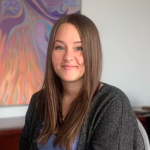
Jennifer Sinclair is a mother of three wonderful children, a gardener and Harm Reduction Supervisor at the Health Equity Alliance in Bangor. She has lived experience of homelessness which informs her work and advocacy for solutions.

Kevin earned his MD from Emory University in Atlanta, and completed his Internal Medicine training at Brigham and Women’s Hospital in Boston, and is board certified in both Internal Medicine and Addiction Medicine. He has a passion for bringing clinical care to those who most often fall through the cracks, and meeting patients wherever they are physically, emotionally, or situationally. When confined to four walls he sees patients at 63 Preble St—the Health Care for the Homeless clinic.

Samantha Velez is a person in recovery with the lived expertise of homelessness. She is a mother, a survivor, and was born and raised in Maine. She has presented on national trainings to health centers on various topics including trauma informed care and harm reduction. She is an advocate for better health care delivery and decreased stigma for people experiencing homelessness and living with substance use disorders.

Hailey Virusso is the Director of Teen Housing & Outreach Services at Preble Street, where she works to provide innovative solutions to youth homelessness. A Licensed Clinical Social Worker, Hailey has built her career around providing supports and services to best meet the needs of youth in a variety of situations. Before joining Preble Street in 2021, Hailey was the Director of Youth Services at The Opportunity Alliance, managing a recovery oriented, integrated health service focused on improving health outcomes, cost effectiveness, and improved consumer engagement for the population served. Hailey holds a Bachelor of Social Work from the University of Vermont and a Master of Social Work from the University of Southern Maine.
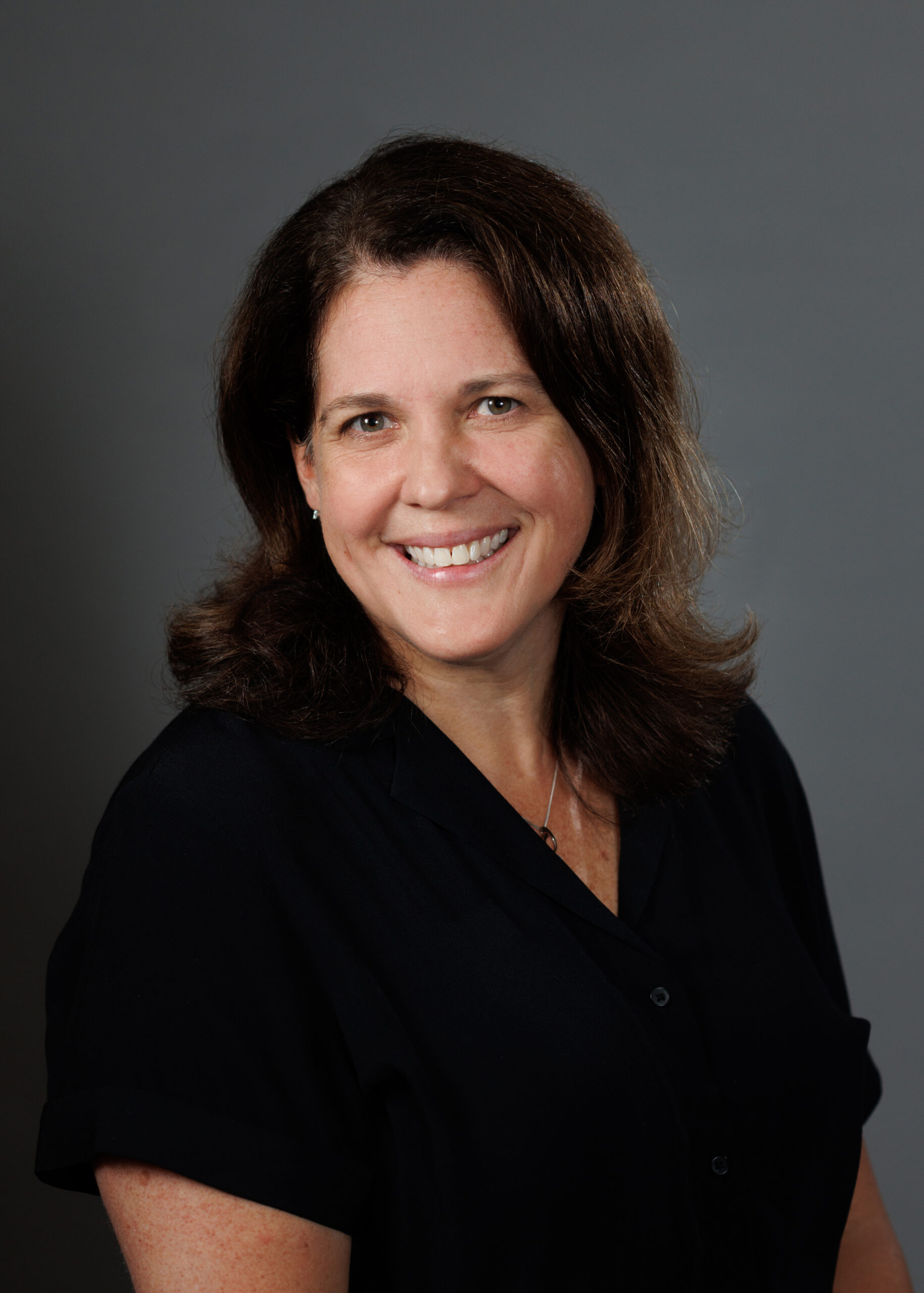
Jill Ward is Director of the Center for Youth Policy and Law at Maine Law. As Center Director, Jill works with clinic students, faculty, and system stakeholders to advance policies and practices to reduce harm and to increase positive outcomes for current and former system-involved Maine youth. She has been actively involved in the reform conversation in Maine as one of three co-chairs of a statewide juvenile justice task force, as chair of Maine’s Juvenile Justice Advisory Group and as a partner in the Regional Care Team initiative with the Department of Corrections and USM’s Cutler Institute. She has worked as an advocacy and policy consultant on youth justice issues for state and national organizations, including the Maine Children’s Alliance, the Campaign for Youth Justice, and the Youth First Initiative. Prior to returning to Maine in 2007, Jill worked in the U.S. Senate and for several national non-profits, including the Children’s Defense Fund where she co-chaired the National Juvenile Justice and Delinquency Prevention Coalition.

Heather is a third-year student at Yale Law School. She is a Student Director for the Lowenstein International Human Rights Clinic, where she works on establishing independent oversight of carceral systems and federal litigation challenging the physical and psychological abuse and torture of people with disabilities incarcerated in Connecticut prisons. She also co-directs the Haven medical-legal partnership, which serves undocumented immigrants in the New Haven community. Prior to law school, Heather spent a decade working as a human rights advocate, community organizer, and researcher in Maine and around the world.
Creating a better shelter system, housing, advocacy, and health care services are just a few of the topics that will be discussed throughout the day. As a sponsor of this conference, you’ll be directly supporting these important conversations and the impacts that result from this day.
As a sponsor, you will receive:
PRE-EVENT MARKETING
- Organization logo on all pre-conference materials, including conference emails and website
ON-SITE MARKETING
- Organization logo on signage at the event
- Organization mentioned during the event Welcome remarks
- One table in the main conference exhibition area
- Complimentary registration(s)
For more information about becoming a sponsor of the Preble Street Conference of Homelessness, please email us.
